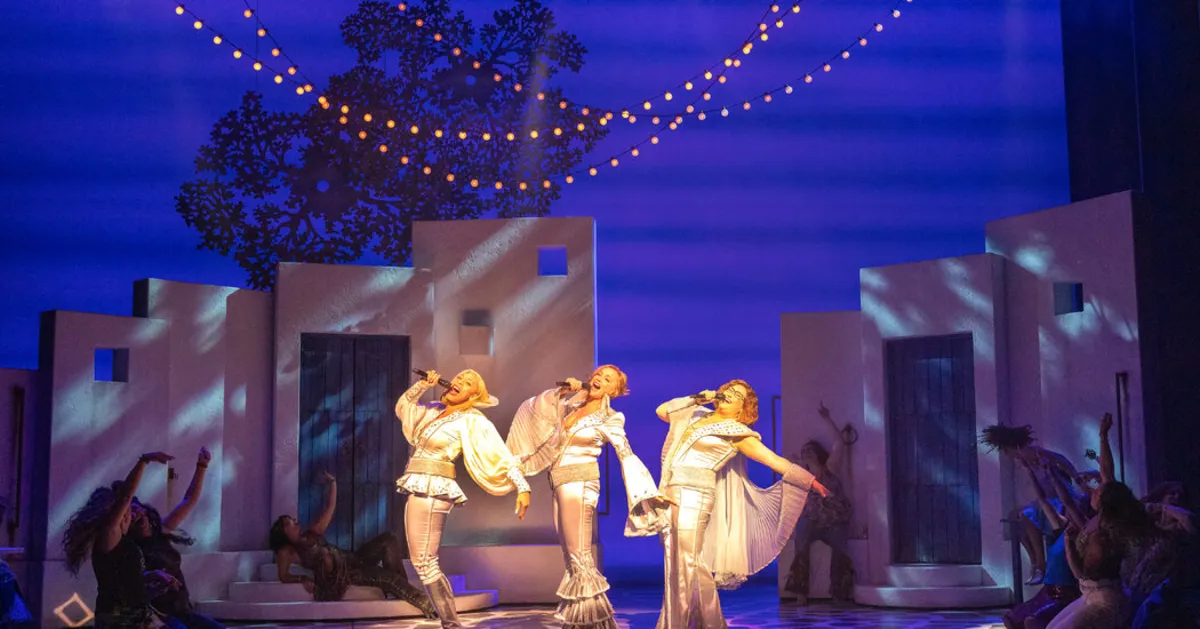
The beloved Abba jukebox musical, Mamma Mia!, has made its triumphant return to Broadway, but it’s important to note that this isn’t just a simple revival. This is a much-anticipated “return engagement” of the original New York staging, which took its final bow 10 years ago. This strategic move by the show’s producers can be interpreted in two ways: either as a reluctance to invest in a new version, banking instead on the audience's nostalgia for the iconic feel-good musical, or as a fascinating glimpse into a real-life time loop. Generations continue to discover Abba’s timeless music, and Mamma Mia! itself seems to have an unshakeable hold on our culture, resetting each time the world appears ready to move on.
Just like Abba itself, the name Mamma Mia! is a palindromic wonder, creating a sense of infinite possibility. Since its world premiere in London in 1999, where it has been a staple of the theatrical landscape, Mamma Mia! has become a ubiquitous presence. It feels like at any moment, this vibrant musical is being performed somewhere across the globe, whether on land or sea. The immersive spinoff, Mamma Mia! The Party, has only solidified the show’s status as an escape from dreary days, while the 2008 film adaptation was a box office sensation, becoming the highest-grossing adaptation of a Broadway musical until Wicked took the crown. Even the less successful sequel, Mamma Mia! Here We Go Again (2018), left the brand unscathed.
Currently, Mamma Mia! is back at the Winter Garden Theatre, the same venue that hosted its Broadway debut in 2001. This engagement coincides with the 25th-anniversary North American tour, making a pit stop before heading to Wilmington, N.C., in March. Interestingly, this fall has seen a trend on Broadway where shows are picking up where they left off, with Beetlejuice also making a return. This reflects the deep-rooted nostalgia that audiences hold for these productions.
While this version of Mamma Mia! has been slightly downscaled, particularly in its set design, it still delivers a delightful experience. The energy in the performance I attended was noticeably more vibrant than during the show’s previous Broadway run. Under the musical direction of Will Van Dyke, the band played with infectious enthusiasm, while the cast, energized by Phyllida Lloyd’s staging and Anthony Van Laast’s choreography, brought a spring to their performances.
For those who may be unfamiliar with the storyline, Mamma Mia! centers around Sophie (played by Amy Weaver), a 20-year-old bride-to-be who invites three men to her Greek island home to help her discover the identity of her father. Her mother, Donna (Christine Sherrill), faces the emotional turmoil of past romances resurfacing, albeit with the support of her two best friends, Rosie and Tanya (played by the scene-stealing Carly Sakolove and Jalynn Steele, both delivering stellar comedic performances).
While the show is undeniably cheerful, it does have its share of plot holes that have emerged over its 25-year run. For instance, some may wonder how Sophie met her two best friends. Additionally, while Sherrill possesses a powerful voice, her portrayal of Donna sometimes lacks the emotional vulnerability needed for her poignant number, “The Winner Takes It All.” The irony is that, although Mamma Mia! is a joyous musical, its score often reflects the bittersweet essence of Abba’s music, which has been described as "dopamine hits with a blue chaser," as noted by Abba’s Benny Andersson during his Rock & Roll Hall of Fame acceptance speech in 2010.
Mamma Mia! cleverly mirrors Abba's musical style and features a circular narrative structure. The show opens with Sophie singing a snippet of “I Have a Dream” and returns to it at the end, creating a sense of continuity. However, the show surprises audiences with a stand-alone encore after the curtain call, a practice that has since been adopted by other jukebox musicals, including Tina: The Tina Turner Musical. In the world of Abba, the story never truly concludes, much like the band's career.
Despite the band members going their separate ways in 1982, the legacy of Abba has only grown stronger over the years. Even after their chart-topping success in the 1970s and the subsequent divorces among the couples, the members continued to make significant contributions to musical theater, crafting scores for original productions long before other pop icons turned to Broadway. Their reunion in 2021 for the album “Voyage,” which evokes the sound of their earlier work, was both surprising and expected. The introduction of “Abbatars,” virtual representations of the band as they appeared in 1979, has ensured that Abba remains a timeless presence in the entertainment world.
For those who have yet to experience the charm of Mamma Mia!, now is the perfect time to witness this enchanting production. The show runs through February 1 at the Winter Garden Theater in Manhattan. For more information and to purchase tickets, visit mammamiabway.com. Running time: 2 hours and 30 minutes.